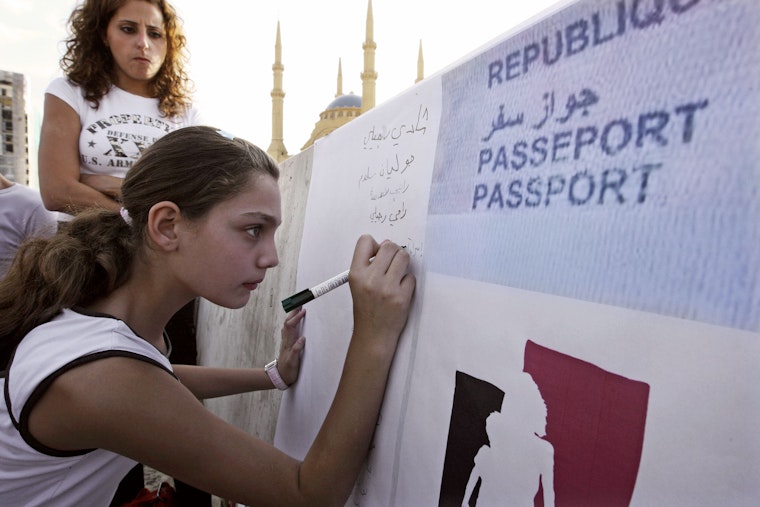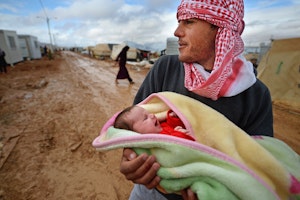The Lebanese Nationality Law That Leaves Children Stateless
By Christine Chamoun

After fleeing Lebanon’s civil war in 1987, I moved to Sweden, where I spent most of my adolescent life before moving to other countries for my studies and work. It wasn’t until the age of 31 that I found out I would not be able to pass on my Lebanese nationality to my future children—not because I no longer live in Lebanon, but because I am a woman.
Article One of the Lebanese nationality law is very clear: A child is deemed Lebanese if the child is born of a Lebanese father. In other words, the law allows Lebanese men to pass on their nationality to their children and to their non-Lebanese wives, but denies Lebanese women the right to give their nationality to their own children if their husbands are not Lebanese.
The law has major repercussions for Lebanese women and their children, and in 2009 I returned to Lebanon to observe some of these effects for myself. The Lebanese women I talked to were completely unaware that the law even exists, and had therefore not taken into account their husbands’ nationality when deciding whom to marry. All of those who had married non-Lebanese men learned of the consequences of their decision when they tried to register their firstborn and were told that their child could not be added to their family register because they were not considered Lebanese.
The fallout for these women varied greatly. Some of their children managed to acquire their father’s nationalities, but children and husbands are required to obtain residency permits to remain in the country, and can only work if their employer is willing to pay a fee to obtain a work permit for them.
In recent years, the residency permit rule has been eased—now there are free, three-year renewable residency permits available for the foreign spouses and children of Lebanese women. But the process is cumbersome and subject to the whims of the official in charge of the file. In addition, foreign husbands and children of Lebanese women face obstacles in accessing basic rights such as education and health care.
For others, the consequences were even more catastrophic. I met women whose husbands could not pass on their nationalities to their children, leaving their children stateless. The only legal document these children have is a paper from the local mayor acknowledging their existence. Even though they were born to Lebanese mothers and have lived their whole lives in Lebanon, their “suppressed status”—which they’ll likely pass on to their children, as well—means they have no rights. All of the women I met with talked about the pain, humiliation, and anger they felt towards the Lebanese authorities and society for treating them and their children like second-class citizens.
This law’s impact is almost incomprehensible. Lebanon is considered a relatively liberal and progressive Arab country, but when it comes to gender equality, it has a long way to go.
Lebanese officials and many other people I spoke to oppose the right of women to pass on their nationality to their children and spouses. They argue that extending this right to women could disturb the country’s demographic balance. None of them could explain how men could do just that without unsettling the country.
Some even went on to say that Lebanon would be invaded by citizens from other Arab countries, who would marry Lebanese women just to get the Lebanese nationality. This struck me as ironic, as there is a long tradition of Lebanese migrating to Europe and North America in order to acquire a second nationality.
Such discrimination persists not only in Lebanon, but in many other countries in the region, such as Jordan, Syria, and most of the Gulf countries, whose laws still stipulate that nationality can only be transferred from father to child. I travelled across the region and interviewed women from different economic, religious, and social backgrounds. Their disheartening and enraging testimonies were captured in a short documentary, Our Mother’s Country: Our Country.

In 2013, Ben, my English husband, and I welcomed into the world Chloe, our daughter. Fate would have it that Ben was offered a job in Lebanon with the UN a few months before I was due. So Chloe was born in Beirut and has a Lebanese birth certificate. But that’s all she has and will ever have unless Lebanon reforms its unjust and discriminatory nationality law.
While I was holding her in my arms in the hospital, all I could think about was how she would view Lebanon in the future. Would she ever identify with her mother’s country, or reject it just like it rejects her? Would she be able to stay in Lebanon for more than one month at a time to visit her grandmother? Would she be able to live there in dignity as an adult, or be forever considered a foreigner?
Fortunately, Chloe has another nationality and is in a better place than thousands of kids born to Lebanese mothers and stateless fathers. Unless things change, those who are born into statelessness are likely to stay that way, and bring stateless children into the world.
We work with civil society partners in Lebanon and the region, such as the Legal Agenda, which has strived to remedy this unjust situation and address the gaps in understanding access to citizenship in the region. Together, we must promote alternative concepts of nationality and gender equality that will lead to more open and inclusive societies so that one day, Chloe will be truly Lebanese.
Until May 2017, Christine Chamoun was a program officer for the Open Society Women’s Rights Program at the Arab Regional Office.
